Join eOrganic for a webinar on challenges in breeding tomatoes, with the right combination of great flavor and disease resistance! It takes place on March 24, 2026 at 11AM Pacific, 12 PM Mountain, 1PM Central, and 2PM Eastern Time. It's free and open to the public, and advance registration is required.
Register now at https://oregonstate.zoom.us/webinar/register/WN_eExWeuzBSuy2_naFGJlTjg
About the Webinar
In this webinar, plant breeders will discuss how they are meeting the many challenges involved in the goal of breeding tomatoes with good agronomic qualities such as the ability to resist multiple diseases and produce high marketable yields under different growing conditions—and also have good flavor.
Presenters Jim Myers of Oregon State University, Julie Dawson of the University of Wisconsin and Jared Zystro of the Organic Seed Alliance will discuss some of the lessons they've learned and strategies they are using to overcome these challenges as part of the NIFA OREI funded Tomato Organic Management and Improvement Project.

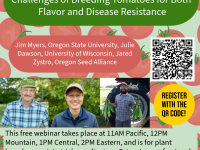

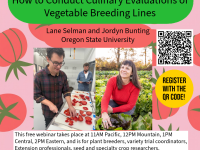
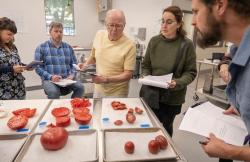 In this webinar, you'll learn ways to evaluate vegetable breeding lines for flavor with structured tasting methods. Participants will learn how to define tasting objectives, choose an appropriate tasting format & qualities to evaluate, and capture usable sensory data that supports breeding and selection decisions. We'll cover evaluation logistics, evaluation form design, strategies for building a shared flavor vocabulary (including progress toward a flavor wheel), and ways to translate results into clear recommendations. As an example, we'll discuss our experience evaluating tomato breeding lines from the NIFA OREI-funded
In this webinar, you'll learn ways to evaluate vegetable breeding lines for flavor with structured tasting methods. Participants will learn how to define tasting objectives, choose an appropriate tasting format & qualities to evaluate, and capture usable sensory data that supports breeding and selection decisions. We'll cover evaluation logistics, evaluation form design, strategies for building a shared flavor vocabulary (including progress toward a flavor wheel), and ways to translate results into clear recommendations. As an example, we'll discuss our experience evaluating tomato breeding lines from the NIFA OREI-funded 
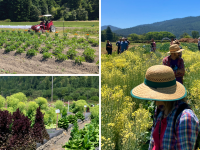

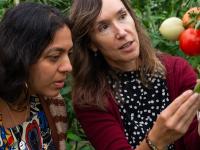
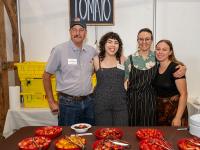
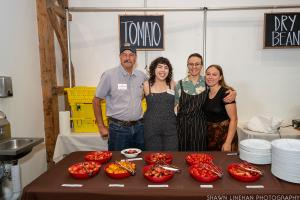 The Variety Showcase, organized by the Culinary Breeding Network, is an annual event dedicated to illuminating the significance of organic seed. Chefs collaborate with plant breeders to craft unique dishes featuring specific cultivars or breeding lines, showcasing the diversity and potential of organic seed. The seed work showcased at these events addresses a wide range of critical issues and values, including climate resilience, culinary excellence, nutritional richness, biodiversity preservation, cultural heritage, spiritual significance, seed sovereignty, and more.
The Variety Showcase, organized by the Culinary Breeding Network, is an annual event dedicated to illuminating the significance of organic seed. Chefs collaborate with plant breeders to craft unique dishes featuring specific cultivars or breeding lines, showcasing the diversity and potential of organic seed. The seed work showcased at these events addresses a wide range of critical issues and values, including climate resilience, culinary excellence, nutritional richness, biodiversity preservation, cultural heritage, spiritual significance, seed sovereignty, and more.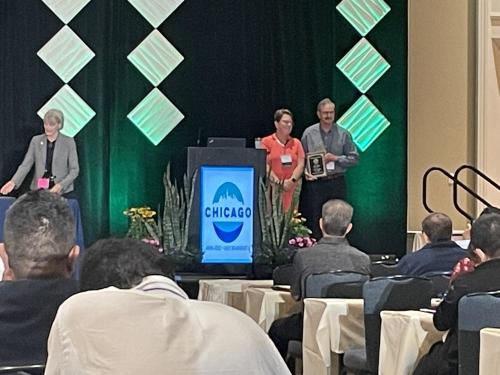 TOMI congratulates James R. Myers on his selection as a 2022 American Society for Horticultural Science (ASHS) Fellow! Jim is the Baggett-Frazier Endowed Professor of Vegetable Breeding and Genetics at Oregon State University. He has taught agronomy, breeding, genetics, germplasm and horticulture classes at the University of Kentucky-Lexington, University of Idaho, Kimberly and Oregon State University. He has had a prolific career breeding vegetable crops for fresh market and processing with improved nutrition, disease resistance, and suitability for organic production-- including beans, tomatoes, broccoli, squash, sweet corn and habanero peppers. Jim directs the NIFA OREI funded Northern Organic Vegetable Improvement Collaborative (NOVIC) and is a collaborator on the Tomato Organic Management and Improvement (TOMI) project. He also works with the Culinary Breeding Network, which brings chefs and breeders together to develop varieties with desirable culinary qualities.
TOMI congratulates James R. Myers on his selection as a 2022 American Society for Horticultural Science (ASHS) Fellow! Jim is the Baggett-Frazier Endowed Professor of Vegetable Breeding and Genetics at Oregon State University. He has taught agronomy, breeding, genetics, germplasm and horticulture classes at the University of Kentucky-Lexington, University of Idaho, Kimberly and Oregon State University. He has had a prolific career breeding vegetable crops for fresh market and processing with improved nutrition, disease resistance, and suitability for organic production-- including beans, tomatoes, broccoli, squash, sweet corn and habanero peppers. Jim directs the NIFA OREI funded Northern Organic Vegetable Improvement Collaborative (NOVIC) and is a collaborator on the Tomato Organic Management and Improvement (TOMI) project. He also works with the Culinary Breeding Network, which brings chefs and breeders together to develop varieties with desirable culinary qualities. 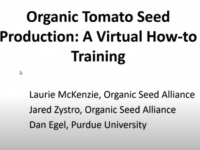
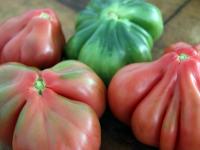
 Are you interested in producing high quality organic tomato seed for your own farm or for sale? Join Tomato Organic Management and Improvement Project (TOMI) partners Laurie McKenzie and Jared Zystro from Organic Seed alliance, and Plant Pathologist Dan Egel from Purdue University for a virtual training on the how-to’s of organic tomato seed production. This webinar will cover tomato biology, climatic requirements, genetic maintenance, disease management, and how to harvest clean and store tomato seed. The webinar takes place on April 20, 2021 at 12PM Pacific Time, 1PM Mountain, 2PM Central, 3PM Eastern Time. It's free and open to the public, and advance registration is required.
Are you interested in producing high quality organic tomato seed for your own farm or for sale? Join Tomato Organic Management and Improvement Project (TOMI) partners Laurie McKenzie and Jared Zystro from Organic Seed alliance, and Plant Pathologist Dan Egel from Purdue University for a virtual training on the how-to’s of organic tomato seed production. This webinar will cover tomato biology, climatic requirements, genetic maintenance, disease management, and how to harvest clean and store tomato seed. The webinar takes place on April 20, 2021 at 12PM Pacific Time, 1PM Mountain, 2PM Central, 3PM Eastern Time. It's free and open to the public, and advance registration is required.